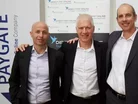How will DPO and PayGate build a pan-African payment service?

The DPO Group, east Africa’s largest online payments processor, today announced a significant majority stake in PayGate, South Africa’s largest online payment processor, to create a pan-African presence. We tuned into the press conference, live tweeted and soaked up all the details. If you missed our Twitter coverage, you can catch up with a brief Q&A :
How big is DPO’s majority stake in PayGate?
We are creating a new holding company in South Africa, which will be held by both 3G Direct Pay Holdings Limited (3GDP) and the current PayGate shareholders. This holding company, will hold a 100 percent shareholding in PayGate. As part of the transaction PayGate has already notified and garnered the support of key clients and partners.
What will it mean for existing clients?
PayGate will continue its business and operations with the existing management, and will retain its clients. The clients will continue their relationship with PayGate management and staff. We aim to use the expanded capabilities of the group to enhance the service offering and add to the already excellent service PayGate is giving today.
What will it mean for staff? Will there be downsizing?
There is no overlapping between 3GDP and PayGate. They complement each other, geographically and service wise. We expect that the merger will contribute substantially to growing the business, and we expect to increase the staff accordingly.
Peter Harvey will continue as the MD of PayGate and will join the board of the Direct Pay Online (DPO) Group. David Beukes will take the role of global CTO for the DPO Group. The DPO Group is excited to be adding not only the experience and skill-set of the senior management, but also bringing on-board the excellent team Peter and David have nurtured in PayGate.
Where will the HQ of the new company be?
The HQ of the group is in Ireland, whilst the pan-African HQ is in Nairobi. The Southern African HQ will remain in Cape Town. The expanded DPO Group will allow clients to draw seamlessly from the Groups “on-the-ground” expertise afforded by the larger geographic footprint.
How will it deal with regulatory issues in different regions? Will it be calling for more harmonisation in SADC to follow suit of the East African trading blocs, and until such time does this add to the costs of delivering services?
As a pan-African Group, we are aware to the different jurisdictions and regulators/ regulations. It is part of doing business in Africa. We envision the group’s understanding of these different regulatory aspects to be a competitive advantage in being able to assist our clients as they grow into Africa. Ultimately, this single point of contact and local understanding will reduce the costs of delivering a pan-African service for our clients, a key driver of this merger.
Finally, both PayGate and the DPO Group have been keen advocates of stronger regulation across Africa and have a deep history in working proactively with regulators, we look forward to be a positive force in shaping the online payment regulations across the continent.
Is this the beginning of consolidation of the payments industry?
We believe that there is a material advantage to scale in the payment industry, especially when one aims to become a pan-African player and provide seamless and world class service. We believe that there is room for consolidation, as most of the players in the online payments space are too small to develop the necessary technology and infrastructure to provide merchants with a service that is comparable to other parts of the world.
We will look to complement this scale with a local understanding of each market, with the aim of ultimately providing our clients the best of both worlds – world class products and services tailored to the African market.
How big is the pan-African e-tailing opportunity?
The African ecommerce market is expected to be worth $50 billion by 2018 (up from $8 billion in 2013), providing a significant opportunity for entrepreneurs and investors. Although ecommerce exists as a long-term opportunity in Africa, it’s growth has been reasonably slow as only 26.5 percent of the 1 billion people living in Africa are connected to the internet.
With inadequate infrastructure and erratic electricity supply, e-commerce faces its fair share of challenges. Apart from these, one of the biggest hurdles that B2C e-commerce in Africa needs to overcome is the lack of viable payment systems. Africa’s bandwidth challenge is well on its way to being resolved, but the online payments system still has a long way to go.
African Business Review’s October issue is now live.
Stay connected: follow @AfricaBizReview and @WedaeliABR on Twitter.
African Business Review is also on Facebook.
- Santander Portugal CEO promoted to regional head for EuropeLeadership & Strategy
- Abu Dhabi Finance Week: 10 speakers you don’t want to missCorporate Finance
- HSBC Middle East building on 134 years of banking legacyLeadership & Strategy
- Finance experts in MENA more receptive to digital currenciesCorporate Finance



